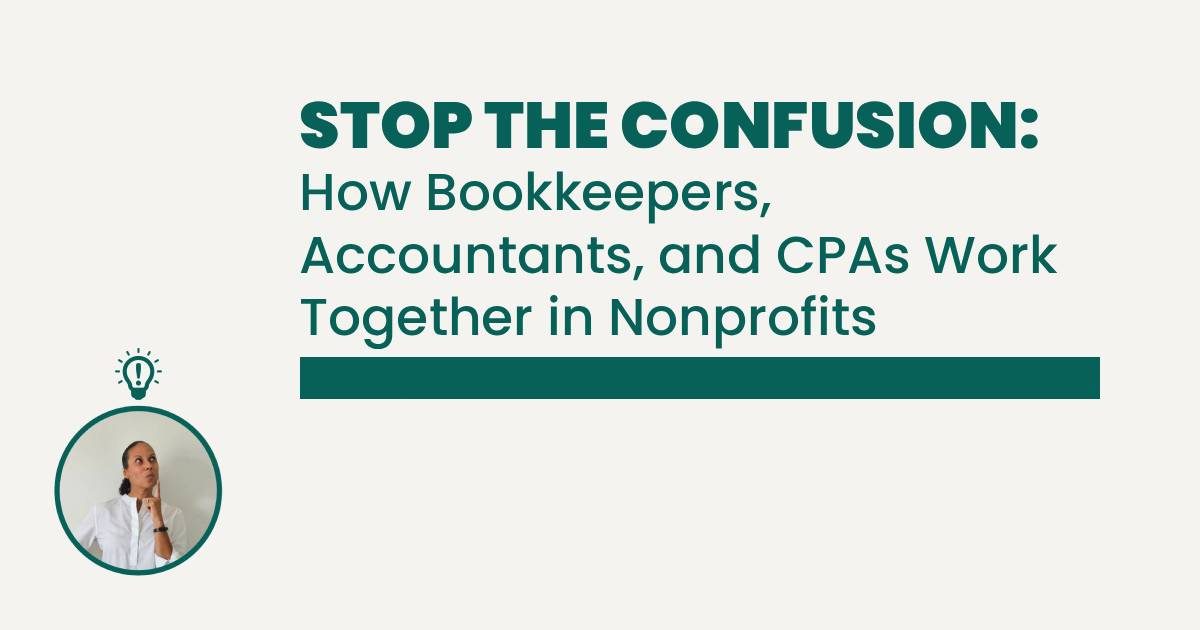Have you ever wondered: Do I need a bookkeeper, an accountant, or a CPA? If you said “yes,” you’re not alone. Many people — nonprofit founders and business owners alike — use accountant and CPA as if they mean the same thing, while bookkeeping gets treated like something separate. In a way, it is — but the truth is, all three play different roles in keeping your nonprofit’s finances healthy.
Here’s the reality: nonprofits need both bookkeeping and accounting to stay organized and make sense of the numbers. Then, when the stakes get higher — like an audit, a tax filing, or strategic planning — that’s when a CPA steps in. Skipping the first two layers and going straight to a CPA is like hiring a surgeon to remove your problem-child of a thyroid when what you really needed first was a good doctor, some bloodwork, and a clear path to healing.
>>> So let’s break this down in plain English — starting with the basic roles and how each one actually works.
The Roles in Plain English
Think of the bookkeeper as the foundation of your financial house. They’re the ones recording every donation, expense, payroll run, and vendor payment. Without them, nothing else works because the raw data isn’t accurate.
For nonprofits, this means tracking restricted vs. unrestricted funds, categorizing program vs. admin expenses, and making sure your books are 990-ready. And because bookkeepers handle every transaction, they get to know the ins and outs of your organization’s finances over time. That familiarity often makes them the first to spot patterns, errors, or opportunities that others might miss.
The Accountant
If the bookkeeper is the builder, the accountant is the translator. They take all that raw data and turn it into meaningful reports. Instead of just showing you numbers, they help you understand what those numbers mean and how they affect your decisions.
In a nonprofit setting, this might include creating budgets, preparing financial statements for the board, or analyzing cash flow so you can plan programs with confidence. A good accountant doesn’t just hand you numbers — they help you make sense of them, even visually through dashboards, graphs, and such, so your board and leadership actually understand what’s going on financially.
The CPA (Certified Public Accountant)
The CPA is the licensed professional who steps in when things get legal, regulatory, or high-stakes. They’re the only ones authorized to perform audits, issue certified financial statements, and represent your organization before the IRS.
For nonprofits, CPAs are often called in for annual audits, advanced tax planning, or complex filings. They shine in situations where compliance and credibility are on the line. The thing is, though, CPAs can only do their job if the books are accurate. If they’re not, they’ll have to spend extra time fixing the mess — and you’ll pay for that cleanup before they even get to the important stuff.
>>> Now that you’ve seen what each role does, let’s look at why people often mix them up in the first place.
A Little History (Why the Terms Get Mixed Up)
Here’s a little history that helps explain where the confusion came from. In the beginning there was bookkeeping, one of the oldest professions, with roots going back centuries. The first known records of double-entry bookkeeping date to 15th-century Italy, when Luca Pacioli (often called “the father of accounting”) published his treatise in 1494. For hundreds of years, bookkeepers and accountants were essentially the same people, carefully recording every sale, loan, and expense.
Then, in the late 1800s, businesses became larger and more complex, and states began regulating the profession to protect the public. In 1896, New York created the first Certified Public Accountant (CPA) license. That credential set apart accountants who met strict education and exam standards and were authorized to audit financial statements and represent clients before regulators.
So, in a nutshell:
- Everyday language stuck with “accountant.”
- The prestige and authority shifted to “CPA.”
- Over time, people started using the two words interchangeably, even though not all accountants are CPAs.
So, that is how the names “accountant” and “CPA” started to blur together — and why the confusion still sticks today. Bookkeeping, however, is still the foundation. But the role has grown, too. These days, most bookkeepers also take on some accounting tasks, helping to bridge the gap between the daily records and the higher-level work that CPAs do.
>>> With that background in mind, here’s what it looks like when you compare all three side by side.
Bookkeeper vs. Accountant vs. CPA — Side by Side
When you look at the three roles together, the differences (and how they fit) become much clearer.
| Role | What They Do | Nonprofit Examples | When You Need Them |
| Bookkeeper | Records every transaction; maintains ledgers; ensures accuracy and organization. | Categorizing restricted vs. unrestricted funds; tracking grants; reconciling bank accounts. | Ongoing — day-to-day operations, always. |
| Accountant | Analyzes and interprets data; prepares reports; builds budgets. | Preparing board financial statements; monitoring cash flow; helping with budget planning. | Monthly or quarterly, for insights and planning. |
| CPA | Licensed professional; handles audits, tax filings, and regulatory compliance. | Conducting an annual audit; filing complex IRS forms; representing you before the IRS. | Yearly or as required by regulations. |
Here’s the workflow in plain English: bookkeepers give you accuracy, accountants give you clarity, and CPAs give you credibility. Together, they cover pretty much everything your nonprofit needs to stay financially healthy.
>>> So the natural next question is: which one does your nonprofit actually need right now?
Which Does Your Nonprofit Actually Need?
Not every nonprofit needs all three professionals at the same time. The right fit depends on your size, stage, and goals.
- Most nonprofit startups and already-operating small nonprofits begin with a bookkeeper. Day-to-day tracking of donations, expenses, grants, and payroll isn’t optional — it’s what makes your reports accurate and your 990 filing possible. Without clean books, nothing else works.
- As you grow from a small to mid-sized nonprofit, you may also need an accountant to help with budgets, financial statements, and interpreting what the numbers mean. This becomes especially important when reporting to a board, planning new programs, or trying to secure grants and funding. And in many cases, experienced bookkeepers already handle some of these accounting responsibilities — giving you both accuracy and insight without having to hire two separate people.
- A CPA is essential for specific situations: audits, complex filings, or when the IRS or state regulators require a certified financial stamp of approval. Some funders may also request audited financials, which only a CPA can provide.
Think of it this way:
- If your nonprofit is small but wants to stay compliant and organized → bookkeeping (with some accounting support if your bookkeeper provides it) is enough.
- If your nonprofit is growing and making more strategic decisions → layer in more dedicated accounting.
- If your nonprofit faces outside scrutiny from regulators or funders → bring in a CPA.
With that said, they’re not competing roles. They work together — taking your nonprofit from accurate records, to clear insights, to trusted compliance.
>>> Let’s pull all of that together and look at how these three roles actually complement each other in practice.
Where They Work Together
Things work best when bookkeepers, accountants, and CPAs aren’t seen as either/or choices, but as parts of the same system. Each role builds on the other, and when they’re aligned, your nonprofit gets both stability and strategy.
- Bookkeepers keep the daily records clean and accurate.
- Accountants organize that information into useful reports and help leadership make decisions.
- CPAs step in for audits, certifications, or regulatory compliance that require a licensed professional.
Here’s how it plays out in practice: your bookkeeper makes sure every donation and grant expense is tracked correctly. The accountant — which may in some cases be the same person as your bookkeeper — uses that information to prepare financial statements for the board and help you plan your next program. Then, when it’s time for an audit or a complex IRS filing, the CPA steps in — relying on the work already done to save you time, money, and stress.
In other words, they’re not competitors. They’re partners in a workflow that takes your nonprofit from accurate records → meaningful insights → trusted compliance.
>>> So how do you decide what to prioritize when you’re building your financial team?
Building the Right Financial Team
Nonprofits do need to choose between the three professions — bookkeeping, accounting, and CPA work — but the choice depends on where you are in your journey. Sometimes you need a bookkeeper, sometimes an accountant, and sometimes a CPA. The key is knowing which one fits your needs right now, and how they can work together as you grow.
Really, you don’t just need numbers entered — you need numbers that tell the right story. That’s exactly what I do.
The important part is understanding how these roles fit together — and recognizing that many nonprofits can get both bookkeeping and accounting support from the same person. That foundation makes the CPA’s work smoother, faster, and often less expensive.
So if your nonprofit is trying to figure out where to start, the answer is simple: begin with clean, consistent bookkeeping and accounting. From there, you’ll know exactly when it’s time to bring in a CPA.
If your organization is ready for books that are accurate, reports that make sense, and finances that are 990-ready, let’s talk.


2 Responses
The information presented here is incredibly valuable. I appreciate the depth of exploration and the clear delivery of your ideas. It’s a fantastic resource for anyone interested in this area.
Thank you so much for saying that! I really appreciate you taking the time to share this—it means a lot to know the article resonated with you.